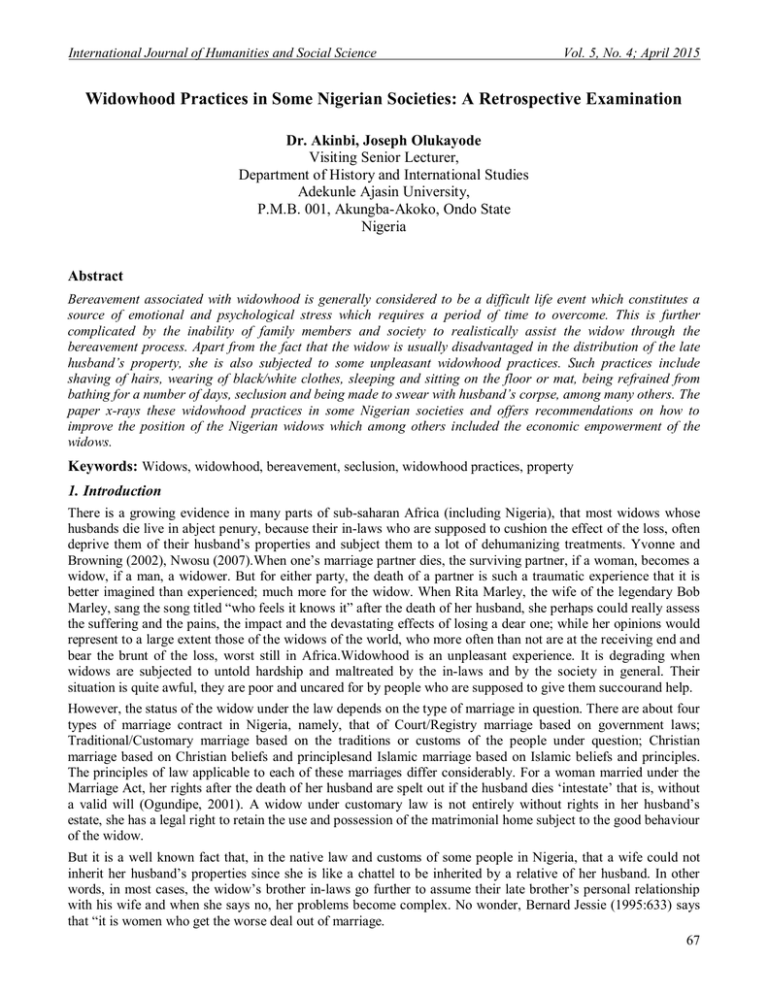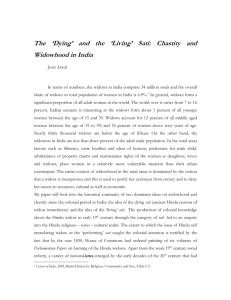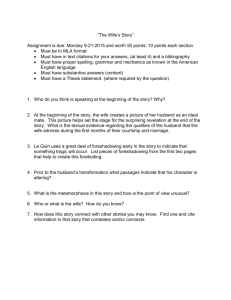Widowhood Practices in Some Nigerian Societies: A Retrospective Examination
advertisement

International Journal of Humanities and Social Science Vol. 5, No. 4; April 2015 Widowhood Practices in Some Nigerian Societies: A Retrospective Examination Dr. Akinbi, Joseph Olukayode Visiting Senior Lecturer, Department of History and International Studies Adekunle Ajasin University, P.M.B. 001, Akungba-Akoko, Ondo State Nigeria Abstract Bereavement associated with widowhood is generally considered to be a difficult life event which constitutes a source of emotional and psychological stress which requires a period of time to overcome. This is further complicated by the inability of family members and society to realistically assist the widow through the bereavement process. Apart from the fact that the widow is usually disadvantaged in the distribution of the late husband’s property, she is also subjected to some unpleasant widowhood practices. Such practices include shaving of hairs, wearing of black/white clothes, sleeping and sitting on the floor or mat, being refrained from bathing for a number of days, seclusion and being made to swear with husband’s corpse, among many others. The paper x-rays these widowhood practices in some Nigerian societies and offers recommendations on how to improve the position of the Nigerian widows which among others included the economic empowerment of the widows. Keywords: Widows, widowhood, bereavement, seclusion, widowhood practices, property 1. Introduction There is a growing evidence in many parts of sub-saharan Africa (including Nigeria), that most widows whose husbands die live in abject penury, because their in-laws who are supposed to cushion the effect of the loss, often deprive them of their husband’s properties and subject them to a lot of dehumanizing treatments. Yvonne and Browning (2002), Nwosu (2007).When one’s marriage partner dies, the surviving partner, if a woman, becomes a widow, if a man, a widower. But for either party, the death of a partner is such a traumatic experience that it is better imagined than experienced; much more for the widow. When Rita Marley, the wife of the legendary Bob Marley, sang the song titled “who feels it knows it” after the death of her husband, she perhaps could really assess the suffering and the pains, the impact and the devastating effects of losing a dear one; while her opinions would represent to a large extent those of the widows of the world, who more often than not are at the receiving end and bear the brunt of the loss, worst still in Africa.Widowhood is an unpleasant experience. It is degrading when widows are subjected to untold hardship and maltreated by the in-laws and by the society in general. Their situation is quite awful, they are poor and uncared for by people who are supposed to give them succourand help. However, the status of the widow under the law depends on the type of marriage in question. There are about four types of marriage contract in Nigeria, namely, that of Court/Registry marriage based on government laws; Traditional/Customary marriage based on the traditions or customs of the people under question; Christian marriage based on Christian beliefs and principlesand Islamic marriage based on Islamic beliefs and principles. The principles of law applicable to each of these marriages differ considerably. For a woman married under the Marriage Act, her rights after the death of her husband are spelt out if the husband dies ‘intestate’ that is, without a valid will (Ogundipe, 2001). A widow under customary law is not entirely without rights in her husband’s estate, she has a legal right to retain the use and possession of the matrimonial home subject to the good behaviour of the widow. But it is a well known fact that, in the native law and customs of some people in Nigeria, that a wife could not inherit her husband’s properties since she is like a chattel to be inherited by a relative of her husband. In other words, in most cases, the widow’s brother in-laws go further to assume their late brother’s personal relationship with his wife and when she says no, her problems become complex. No wonder, Bernard Jessie (1995:633) says that “it is women who get the worse deal out of marriage. 67 ISSN 2220-8488 (Print), 2221-0989 (Online) ©Center for Promoting Ideas, USA www.ijhssnet.com Eweluka (2002) also noted that the customary law permits and perpetuates discrimination on the basis of gender especially in family relations. Women experience and suffer marital frustrations and depression than men and these continue even at the demise of the husband, where a woman will have to face series of dehumanizing treatments from the in-laws, with the claim that, she killed her husband. Olakitike (2009) expressed that these widowhood practices vary from one place to another and many of these practices violate a woman’s human right. This is because from time memorial, societies across the globe have been male dominated and still remains so especially in Africa. Hence, Nwosu (2007) opined that the disorganizing and traumatic experience which accompanies death of husbands, tends to be greater on women than that of men when they lose their wives. For instance, while the wife immediately becomes the primary suspect for her husband’s death, the man is immediately offered an appropriate substitution to comfort him upon the loss of his wife. According to Nwanegbo (1996) in some places the widow will be taken to an isolated place where she will have her food in broken earthern pot, while her hair will either be left unkempt or be completely shaven off; while in some other places, ten men will have to lie with the widow after her husband’s death and she has to cry very early each morning and call her husband by his name, this she will do for one month. Thus, this paper focuses on widowhood practices in some Nigerian societies, reasons for the prevalence of widowhood practices, its implications on Nigerian widows and offer viable suggestions and recommendations tailored towards tackling the predicament of the widows. The paper is rounded off with the conclusion. 2. Widowhood Practices in some Nigerian Societies Despite various changes in the modern Nigerian society, like many other traditional practices, widowhood practices have continued to exist silently or openly in spite of modernisation. In the Nigerian society, as in many other African societies, human greed exist in many families and the death of a male member of the family offers an opportunity to the other male of the extended family to increase their holding of the scarce and inelastic commodity ‘land’. The commodity now in question can expand to other items of properties. Its acquisition, that is, the ownership of the scarce commodity, land, basically controls the treatment of widows. The implication of this is that, the in-laws could throw the widows and their children out or falsely accuse widows of killing their husbands so as to acquire the late man’s properties and land. All other activities serve the same purpose and any mystification and other rituals and superstitious sanctions are geared towards the oppression of the widow. The Nigerian widow, in the course of fulfilling funeral rites, is subjected to a greater agony than the grief of the loss of her husband. The harmful nature of these widowhood practices on the woman as an individual with rights is the focus of this paper. With over two hundred and fifty ethnic groups in Nigeria, the implication is that, there could be as many types and forms of widowhood practices in the country. These practices exist across the nation, but with differences in the forms and extent to which they can be harmful and detrimental to the widows. Most of these widowhood practices are, however, predominant in the Yoruba and Igbo speaking areas of the country, where widows are often times suspected to have caused their husbands’ death. As Ogamba, Ebele (2000:15) puts it, “it is almost a common syndrome that widows are accused of being responsible for their partner’s death”. So they establish their innocence through certain acts. The travails of a widow begins immediately her husband breaths his last breath, she is made to go through various traditional rites, most of them very wicked and dehumanizing. These widowhood practices vary from one place to another. 2.1 Widowhood Practices among the Yorubas Widowhood practices are as old as Yoruba Society itself as they are observed across different Yoruba communities and across different categories of people. A widow is expected to express her sorrow of losing her husband through wearing black clothes, crying and often falling into the ready hands of others surrounding her to prevent her from injuring herself.Adekanye (1988). She is also expected to go into seclusion seven days during which she is not expected to take a bath or change her clothes. As a sign of severing bonds between her and her late husband, she may be expected to unweave her hair, have a low cut, shave or scrape her hairs depending on the type of practice prevalent in such Yoruba community. Similarly,the mourning period varies from one community to another. She is to sit on a bare floor or a mat at best. Fasoranti and Arunah (2007). While in some Yoruba communities, she is expected to eat from broken plates and cooked with broken pots. (Fasoranti and Arunah 2007). At the end of forty days, three months, four months as the case may be, the final rites are performed on the widow. 68 International Journal of Humanities and Social Science Vol. 5, No. 4; April 2015 The final rites include being ‘washed’ in the night after having the final wailing and making some rituals which are expected to finally put the spirit of the departed to final rest and the ‘outing’ which involves change of dresses and being led to the market. According to Aransiola and Ige (2010) widowhood practices is observed among the Yoruba to protect the woman from being harmed by the spirit of the husband; for the woman to prove innocence of the death of her husband and for the husband family to ascertain if the woman had been pregnant as at the time the husband died so that they can claim responsibility and care for the woman among other reasons.Fasoranti and Arunah (2007) noted that after the wailing periods, widows experienced several degradations and deprivation. Among the Yorubas, the widow may be accused of killing her husband and therefore could be asked to swear with either the Holy Bible or the Holy Quran or through other traditional means like being asked to drink the water used for washing the corpse in order to prove her innocence. Adekanye (1988) also noted that at the end of the mourning period, the widow is inherited by a male relative of her dead husband, just like the rest of the man’s property. A process called “Osupo” in Yoruba. But this has been affected by modernization, education, christianityand high level of exposure of the woman; as widows who fall under the above influences will refuse to be inherited like a property by the relative of the dead husband. In the aspect of property, according to Ilozue (2007), using Lagos state as a case study, it is actually when there exists greedy family members that they can then drag the properties with the widow or sometimes, the attitude of the woman when the husband was alive determines the way she is treated. The in-laws will want to collect everything from her, throw her out of the house too, if she was behaving badly to them before their brothers’ death, but if not, there is no reason for taking the late husband’s property and punishing her. Finally, though widowhood practices is still in existence among the Yorubas, factors affecting the intensity and feasibility of practicing such include the educational level and the involvement of a woman in modern industrial labour. Aransiola and Ige (2010).For instance, it is extremely difficult to compel a woman who is working in banking sector to be compelled to stay at home for long period other than the short period, she is allowed by her boss to mourn the death of her husband. It is also not feasible to ask such women to wear black clothes for one year as this contradicts the dictate of her work organization. 2.2 Widowhood Practices among the Igbos Nwanegbo (1996) makes us to understand that, in some parts of Igbo land, when a man dies the wife will tie a wrapper over her chest without a blouse. She must not talk to anybody and will not have her bath until her husband is buried. After the burial, the ‘Umuada’ (daughters of the man’s ancestors) will come to shave her hair, bath her in an open compound, only having the privacy of being surrounded by the ‘Umuada’. Apparently oblivious of the tragic loss which every widow suffers on the death of their husbands, callous in-laws conspire to apply vicious burial rites to dehumanize the embattled widow. They confront her with questions on how and whenthe deceased husband died, the circumstance that led to his death, what she did to save him from dying and her extent of contact with the late husband’s family before his death? Where the explanations are not satisfactory, the widow must drink the water used in bathing the corpse of her husband to prove her innocence.In fact, there is no end to the humiliating punishment encountered by widow under the cover of native laws and customs. Nzewi (1981) found that among the Igbo people of Nigeria, the relatives demand for document relating to the deceased properties including lands, investment and bank account and the widows were required to take oaths as proof that the knowledge of relevant land and personal property of the deceased were not concealed. Subsequently, the widows were required to provide expensive items like a white goat and two jars of palm wine for purification purpose to the female members of their husbands lineage who made and implemented decision on every matter concerning widows. The widows were forbidden to touch any object including themselves without defilement. Hence they were given piece of sticks to scratch theirbodies, while their food is also cooked in old pots rather than those normally used for cooking for other members of the family. Also, they were to sleep on old mats placed on wooden planks which would be burnt at the end of the mourning period. If a woman dies during the one year mourning period, she is perceived as being responsible for her husband’s death and therefore commits an abomination (Nzewi, 1981). 69 ISSN 2220-8488 (Print), 2221-0989 (Online) ©Center for Promoting Ideas, USA www.ijhssnet.com 2.3 Widowhood Practices in other Communities Having reviewed widowhood practices in major ethnic groups in Nigeria, such as among the Yorubas and Igbos, there is need to highlight how these practices are observed among the minor ethnic groups in the country, such as among the Ikwere of Rivers state and the people of AkwaIbom state.Among the Ikwere in Rivers State, the man’s extended family assumes instant control of his belongings when he dies. They give to a woman list of what she has to provide before her husband’s body could be buried. These include goat, yams and drinks, followed by a levy to cover the funeral expenses. The widow will wear a single black mourning cloth for six months and cannot eat with spoon or a decent plate. At the end of the mourning period, there will be a second burial after which she can remarry. Though Christianity has brought about some modification in widowhood practices in the state, such as wearing white cloth instead of black, but the practices still exist (Nigerian Tribune, 15/07/06:03) Furthermore, in AkwaIbom State, according to their custom, there are two forms of widowhood rites. The Christian and the Non- Christian rites. The former involves sacrificing a fowl and shaving the hair during which incantations are said.After her husband’s death, the widow will not be allowed to go out, but will be made to sit on the same location to cry and mourn. She has to wear the same wrapper and blouse for a period of six weeks until after the burial. One of the beliefs of the community is that, a man and his wife shared everything in common in their lifetime. In order to sever the relationship, her pubic hair is shaved, her finger nails cut and buried near the grave. During this ceremony, the following words are said:“this is your share from the body of your wife, so take and leave her alone for she has nothing in common with you as from this day that you are given your share” (African Guardian Magazine, 12/09/88:8-11). The woman will be bathed in public by other women as the final separation ritual. Rites were also performed to separate the children; she is asked to buy dead and dried young chick, which will be used to brush the children’s body.Every part of the house would be swept and the rubbish thrown away at the foot of a plantain tree. These rites are being performed by the elderly widows of the family and it involved one bottle of hot drink, minerals, palm-wine and cooked food.The women camp with the widow for three days. After the burial, items such as jar, plates, cups that belong to the husband will be packed away by his brothers. A little portion of land would be given to the widow if she has a male child. While in Non-Christian rite, in the same community, a widow had to wear the same cloth for six months. After the burial, she will be “put into widowhood” by the older widows of the lineage. She hadto wear a sack for six months. She will provide drinks, fowl, palm-wine and food. She will be asked to confess if she had sex with another man since her husband’s death. She will take an oath and then be able to bath every night if she is not guilty of sleeping with another man, but if she had sex with another man, that is another issue entirely. Again, she will not plait or comb her hair, after eating twice a day, she will not wash her hands until the following day. After the burial, she will not go to the market, farm for another six months. African Guradian Magazine (12/09/1988). When it is time to celebrate her widowhood, the ladies come around and rub her whole body with a substance they called ‘Iduot’. With the sack she is wearing, she will be told to go to the market to buy some items, she will not be allowed to cover her body and her hair. Before leaving the house, she will be given four small sticks to hold in her palms and a particular leaf called “Ofuho” which she puts in her mouth so that she will not talk to anybody. Other ladies will accompany her, at the market she will not go in but will beckon on someone to come, who she will tell what she needs from the market and give the person money to buy the items for her. When she gets home, her hair will be shaved with razor and certain decorations will be done on her body.African Guardian Magazine (12/09.1988). The next being the real celebration day, her sackcloth will be changed to a wrapper. She will be given a hen which is used to rub her whole body and she will be asked to mention whom to marry so that the person will come out and divorce her from her late husband and give some money with yams, fowl, palmwine, snuff, kolanut and she will dance all day. She will be taken to the market accompanied by drummers, dancers, men and women. People will give her gifts, money and food items. After that,she will be accompanied home by those who dance to the market with her and they will be served food and drinks;after all these, they will all leave in the evening and the widow will then be free to go to the stream, market, farm and everywhere she wants. (African Guardian Magazine, 12/09/88). 70 International Journal of Humanities and Social Science Vol. 5, No. 4; April 2015 3. General Patterns of Widowhood Practices in Nigeria Generally, most of these harmful widowhood practices examined in this paper include: 1. Shaving of Hairs 2. Wearing of Black/White clothes 3. Sleeping on the floor or mat 4. Refrain from taking bath for a period of time 5. Being made to swear with Husband’scorpse 6. Seclusion 3.1 Shaving of Hairs This includes even the pubic hairs, with broken bottle for shaving the hair on her head and razor for the pubic hair. In some places, there will be certain designs on her head after literally scrapping off the hairs. The significance of this is that, since the husband is dead, there is nobody to beautify her hair for, at least for a period of time (Ilozue: 2007). 3.2 Wearing of Black/White Clothes This is meant to indicate that the widow is mourning and to make the widow un-attractive as well as to let everybody knows that her husband is dead. 3.3 Sleeping and Sitting on the Floor or mat The symbolic effect of this by a woman at the death of her husband is dethronement .Because a woman by marriage becomes absorbed into the husband’s family and is recognised by her role as a wife, therefore, the loss of her position and entitlements in the family, hence, the sitting on the floor or mat. Also, this act is a sign of mourning and grief. (Nzewi,1981). 3.4 Refrain from Bathing for a Number of Days Neglecting a personal appearance and hygiene is really a terrible practice as we know how bad people feel when they fail to attend to their personal hygiene; particularly for a woman. The widow will be forced to stay for a number of days without bathing. This practice is simply unspeakable, unimaginable and honestly cruel, for a woman that just lost a husband, who needs pity and not punishment. Yet, widows go through this particular rite for the love of their late husband’s though to their detriment. 3.5 Being made to Swear with Husband’s Corpse This is the worst of the practices and violations against women; though it is meant to prove if the women killed the husband or not either with witchcraft, poisoning and the likes; the act is simply disgusting. Once a man dies, the in-laws immediately accuse the wife and ask her to confess to the killing, and to prove her innocence, she must be made to drink the water used in bathing the corpse of the late husband. If she refuses, obviously, she killed the husband. Therefore, she must be punished; or the widow crosses the husband’s coffin three times, if she dies before the mourning period is over, she will be thrown into the evil forest because her death confirms her a murderer (Nzewi, 1981). 3.6 Seclusion Seclusion and general isolation of the widows for a certain period from the community is a widespread practice in Africa. But its intensity and duration varies. In the islamised communities of West Africa including the islamised sections of the Yoruba States in Nigeria, this period was known as ‘Iddat’. The purpose behind ‘Iddat’ on widowhood is to determine the paternity, should the woman turn out to be pregnant and also intended to give the widow time to recover from her bereavement. For non-Islamic societies of Africa, the period is much longer depending on the particular society (Sharka, 1996). In most parts of the Igbo society, the early parts of this period are usually rigorous. During the first 28 days, the widow is not allowed to go anywhere; certain rituals must be performed at the expiration of the 28 days before the widow can perform normal activities. At this point, she must refrain from bathing, she must sit on the ground, her food must be prepared separately and she is fed by another widow from a broken plate which will be thrown away after the seclusion period. She will hold a kitchen knife or broom stick because she is not allowed to touch any part of her body with hands, but must use this knife or broom stick. 71 ISSN 2220-8488 (Print), 2221-0989 (Online) ©Center for Promoting Ideas, USA www.ijhssnet.com At this time, she is regarded as unclean, the knife or brown stick is also to protect her from the spirits, which may attack her during this period (Umejesie, 2002). To aggravate the misery of widows, every movable items are often transported homewards by the in-laws, leaving the poor widow empty handed. The primordial notion is that, every asset in the family belongs to the husband, though this assumption is wrong in modern society in which both couples contribute to the family up-keep, but the in-laws will not hear of that, this act plunged widows deeply into poverty coupled with the grief of losing a husband. These double actions results into shock, emotional crack and temporary loss of sense or even relapse into a coma for days. Umejesie (2002). 4. Reasons for Prevalence of Widowhood Practices Many reasons could be adduced to be responsible for the prevalence of widowhood practices as highlighted below: 4.1Superstitious Beliefs There is the wide-spread belief in African societies including Nigeria that without all these rites and practices, the spirit of the dead man will not have rest, instead his soul will be wandering around and in some cases the dead man’s spirit will be destroying things and hurting people in the community. So, the wife has to go through all these widowhood practices to appease the dead. 4.2 State of Joblessness of the Wife This is another contributory factor, where wives depend solely on their husband for survival. This usually placed them at abject poverty level after the death of their husbands as other members of the extended family would want to lay claim to the deceased husband’s properties. If women are economically empowered, they would be able to stand up and refuse to compromise to these obnoxious widowhood practices. 4.3 Lack of Education Ignorance, people say, is a disease. Most of the women who are victims of these widowhood practices believed in their culture and are very hard to convince. Also, there are still some sections of the country that do not strongly believe in educating girls. An educated woman would not succumb to be abused and be maltreated as a widow. Education of the girl child therefore becomes very important as it may serve as future security against various forms of violence against women especially widowhood practices. 4.4 Failure of Men to Write a Will Most husbands do not bother to write a will before their death and when a mere suggestion is made by the wife, this might attract a village or family council meeting on the basis that she is planning to kill the husband so as to inherit his properties. Lack of any written will pertaining to inheritance of properties will place the wife at a disadvantaged position since the in-laws would want to confiscate their brother’s properties, show antagonism to the wife and evict her from the family house. 4.5 Lack of Respect for Womenfold This is another cause of these obnoxious practices. Africa is being seen to be “a man’s world’’, due to our patriarchal background therefore, women are being treated as an article, like chattel that was purchased, which you can drop or transfer. This belief makes the in-laws to treat the wife without respect when the husband dies. 4.6 Bad Character of the Wife Though traditionally this should not be a reason, but the attitude of the wife contributes to the kind of treatment she will receive from the in-laws at the death of her husband. If a woman is of no good attitude, the in-laws used the avenue (these practices) to get their own pound of flesh. 5. Implications of the Practices on Nigerian Widows Widowhood is an unpleasant experience. It is degrading when widows are subjected to untold hardship and maltreatment by their in-laws and by the society. Widowhood practices have destabilizing effects on widows as could be seen below: 72 International Journal of Humanities and Social Science Vol. 5, No. 4; April 2015 5.1Economic and Dehumanizing Effects The widows are poor and uncared for by people who are supposed to give them succour and help. Thus, many widows face extreme poverty, discrimination and dehumanizing treatments. They were miserably deprived of their social security and family support. Their children too are isolated, often in unhealthy condition, physically abused and at times without inheriting any property. 5.2 Psychological and Health Effects Another unpalatable effect of these widowhood practices is that many widows become emotionally deranged and psychologically unstable and are prone to shock, temporary or even permanent loss of memory and sense. Health wise, they are prone to any kind of diseases, especially after drinking the disgusting water used in bathing a corpse. Many widows are diagnosed more hypertensive due to the burden they bear alone. (Yvonne and Browning, 2002). 5.3 Social Effects Widows are being avoided in the society as if it is an abomination to be a widow. Most of them lose their friends and they finally become loners and they are highly prone to committing suicide to end the sufferings. 5.4 Political Effects Politically, many widows cannot seek for political offices because of their status and due to the fact that men and women in the society will not respect them. However, some widows who know their rights and refused their being made silent in the society usually fight and achieve what they want to achieve in the society, their status notwithstanding. 6.0 Towards Tackling the Predicament of Widows The following suggestions and recommendations will contribute significantly towards solving the predicament of Nigerian widows. 1. There is need for government to make a legislation prohibiting all the obnoxious widowhood practices. This especially will be geared towards extricating widows from all sort of sufferings associated with widowhood. 2. Economic empowerment is advocated for women. They should find and be given viable jobs and not depend solely on their husbands. Sheppard (1989) noted that more women are taking up industrial labour in the modern times. Women are having more access to education and are becoming economically independent compared to traditional societies. 3. Girl-child education should be encouraged in places where they are being discountenanced in Nigeria. This will go a long way to furnish women with their rights and make them to reject barbaric customs and practices. 4. Husbands are advised to make adequate provision for their wives and children by leaving behind a will. This will save their family from a lot of psychological, physical and financial embarrassment and trauma. 5. Women (wives) should also exhibit good conduct towards their in-laws. 6. There is need for all and sundry to show compassion to the widow and their children. Because a widow and a child of a dead man reminds us of the deceased. 7. There should be increasing assistance to widows by Non-Governmental Organisations such as Mums and Widows Association (MWA), Widows Support Center (WSC), churches and well-meaning individuals. 7. Conclusion From the afore stated, attempt has been made to give a retrospective examination of widowhood practices in some Nigerian societies.The paper noted that widowhood practices varies from one Nigerian community to another, but the general patterns involved in the practices were exhibited. In the paper, widows were subjected to a lot of dehumanizing practices due mainly to the patrilineal nature of the Nigerian society that is male dominated, while the customary laws of the society are also skewed favourably towards men and women have been disadvantaged from time immemorial. This explains why the society always pity men and seek to offer succour for them when they lose their spouse, while the same society suspected women for the death of their husband. However, in contemporary time, factors like modernization, education , involvement in industrial and other bureaucratic jobs, christianity and high level of exposure of the women have gone a long way in ‘watering down’ most of these harmful widowhood practices. 73 ISSN 2220-8488 (Print), 2221-0989 (Online) ©Center for Promoting Ideas, USA www.ijhssnet.com Therefore, the economic empowerment of the Nigerian women (widows), among other recommendations, is advocated to liberate the women folk from these harmful widowhood practices. Specifically, the paper discussed most of these harmful widowhood practices among the selected Nigerian societies, the causes of the prevalence of such practices, the implications of the practices on Nigerian widows and offer viable and practical suggestions geared towards tackling the predicament of the widows. References Adekanye, T.O. (1988): “Women and Rural Poverty: Some Considerations from Nigeria”, African Notes, No. 3, 63-67. African Guardian Magazine (1988): September 12,8-11 Aransiola, J.O. and Ige, A. (2010): “Widowhood Practices among the Yorubas of Southwest Nigeria: Are there Differences in What Women Experience due to their Status?” Gender and behaviour, (online) Available: http..dx.doi.org/10,4314/gab.v8 12.61939. Bernard, J. (1995): “Death is very much alive,” A Socio-thanalogical Perspective, Volume VII,No. 2, 633. Eweluka, U.U. (2002): “Post-colonialism, Gender, Customary injustice: Widows in African Societies”, Human Rights Quarterly, May Vol. 24, No. 2, 99. Fasoranti, O.O. and Aruna, Y.O. (2007): “A Cross-cultural Comparison of Practices Relating to Widowhood and Widow-inheritance among the Igbo and Yoruba in Nigeria”, Journalof World Anthropology; Occasional Papers, Volume 111, No.2, 373. Ilozue, U.A. (2007): The Predicament of Nigerian Widows: A Case Study of Widows in Lagos State”, Unpublished B.A. Long Essay, Department of History and Diplomatic Studies, OOU, Ago-Iwoye, Nigeria, 22-30. Imasogie, M.O. (2001): “Violence against Women: An International Perspective” in J.A. Sokefun (Ed.), The Family and the Law, (pp. 43-48),Ago-iwoye, Faculty of Law,OOU. Nigerian Tribune (2006): July 15,03 Nwanegbo, N.A. (1996): Challenge of Widowhood, Enugu, SonnieOrganisation Ltd, pp 11-13. Nwosu, C. (2007): “Widowhood Practices: and Religion in Nigeria”, A Term Paper Presented to the Department of Sociology, University of Nigeria, Nsukka, September. Nzewi, D. (1981): “Widowhood Practices: A Female Perspective,” A Paper Presented at a Workshop on Widowhood Practices in Imo State, Nigeria, June, 6-7. Ogamba, E. (2001): Widow Joy, Enugu, RhyceKerexPublishers, pp. 15-20. Ogungbemi, M.O. (2001): “Succession in Nigeria” The Plight of Widows” in J.A. Sokefun (Ed.). The family and the Law (pp. 140-145) Ago-Iwoye, Faculty of Law, OOU. Olakitike, O. (2009): “Cruelty in the Name of Culture”, Pulsewire Magazine, http://www.worldpulse.com/user/1265/journal Sheppard.D. (1989): “Organisations, Power and Sexuality: The Image and Self Image of Women Managers,” in J. Hearn, D.L. Sheppard, P. Tancred-Sherrif, and F. Burrell (Eds.) The Sexuality Organisation, (pp. 139157), London, Sage. Shirka, G. (1996): Women, Law and Society: An Actual Manual for NGO’s, Pakistan, ShirkaGah Publishers, pp. 120-125. Umejesie, I. (2002): Angelina: The Story of African Widow, Aba, Oxford Publishers, pp. 2-28. Yvonne, D.W. and Browning, C.Y. (2002): Widowhood U.S.A, Gale Group Inc. Gale Encyclopedia of Public Health, 2002. www.healthline.com/galecontent/widowhood. 74







